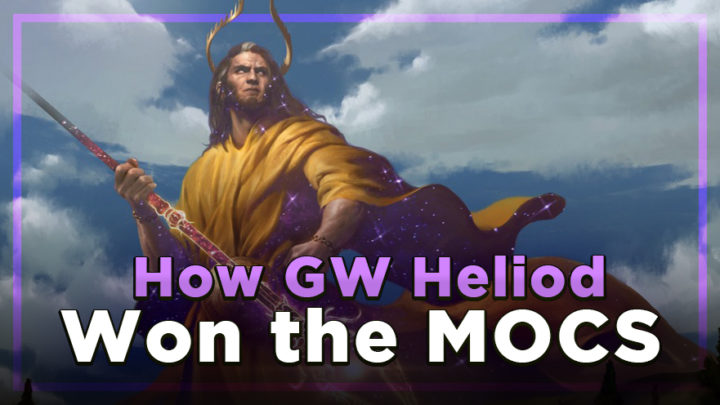Last weekend, we saw Michael Jacob (aka DarkestMage) win the Magic Online Championship Series. The MOCS is perhaps the single most difficult Magic tournament in any given year, and his win is an impressive feat.
While the MOCS is a multi-format tournament, Modern made up the lion’s share of total rounds, with four rounds during the Swiss and two more in the Top 4 playoff. Jacob navigated his Heliod Company deck through 23 of the best players in the world, but how did he do it? That’s what we’re here to discuss today.
The Deck
Heliod Company by Michael Jacob, 1st place, MOCS
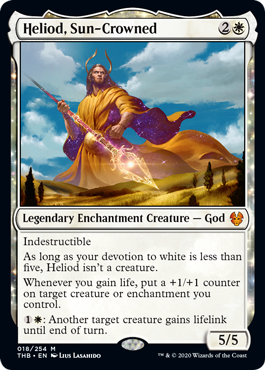
4 Forest
1 Gavony Township
3 Horizon Canopy
2 Misty Rainforest
1 Pendelhaven
2 Plains
1 Prismatic Vista
4 Temple Garden
4 Windswept Heath
4 Arbor Elf
2 Auriok Champion
4 Conclave Mentor
1 Giver of Runes
4 Heliod, Sun-Crowned
3 Ranger-Captain of Eos
2 Scavenging Ooze
1 Skyclave Apparition
1 Spellskite
4 Spike Feeder
2 Walking Ballista
4 Collected Company
2 Eladamri’s Call
4 Utopia Sprawl
SIDEBOARD
1 Auriok Champion
1 Aven Mindcensor
1 Celestial Purge
1 Eidolon of Rhetoric
1 Giant Killer
2 Path to Exile
2 Skyclave Apparition
3 Surgical Extraction
3 Veil of Summer
The first step in understanding how Heliod Company won the MOCS is understanding what the deck does. The Heliod Company mission statement is to be a creature combo toolbox deck. There are a few different infinite combos rolled up in this list, and they all revolve around Heliod, Sun-Crowned.
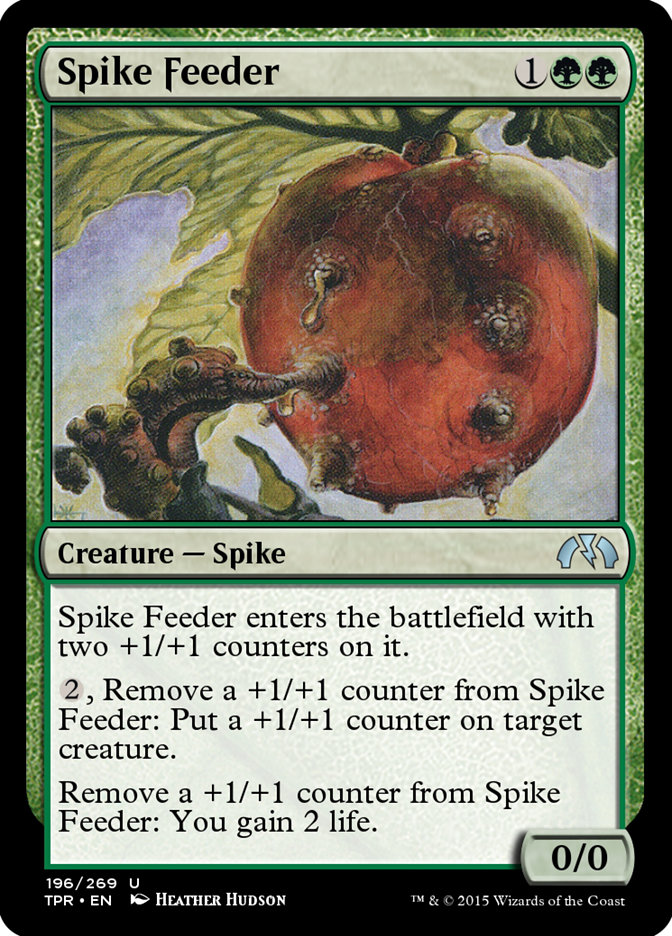
Heliod + Spike Feeder is a simple-to-execute, infinite life combo. If you have both in play and remove a +1/+1 counter from Spike Feeder to gain two life, Heliod will trigger to put another +1/+1 counter on Spike Feeder. Repeat this loop as many times as you wish, for as much life as you want.
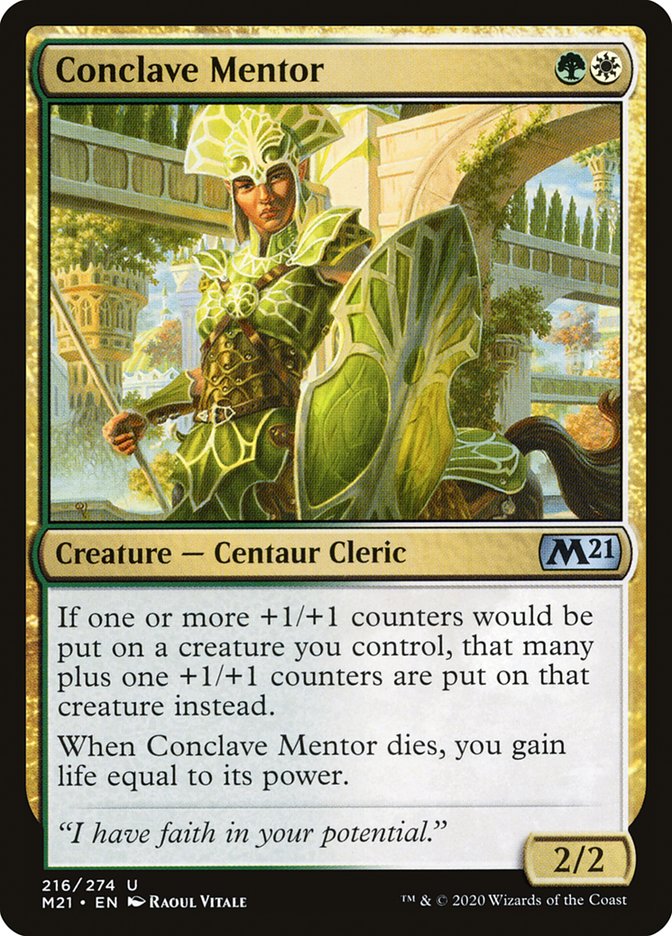
Adding Conclave Mentor to the Heliod + Spike Feeder combo will result in not only infinite life, but a board full of infinitely large creatures. Each time you execute the life gain loop, Conclave Mentor allows you to put an extra +1/+1 counter on your Spike Feeder. Once Spike Feeder is arbitrarily large, you can start removing counters for life, and then pointing the Heliod triggers at your other creatures.
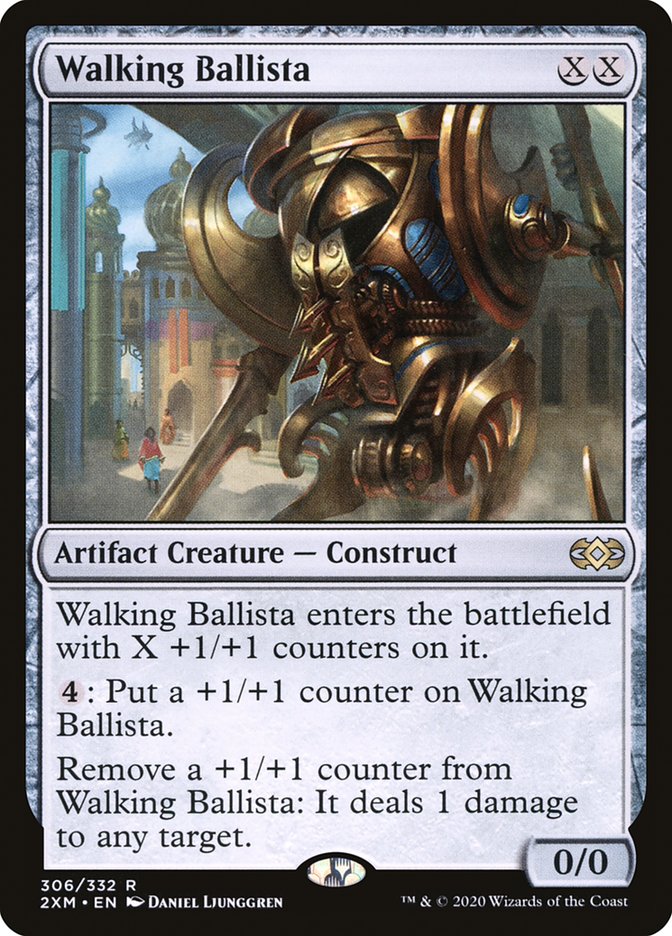
Walking Ballista + Heliod is the last of the infinite combos, and the one that can kill your opponent on the spot. For this to work, you’ll need Heliod in play and a Walking Ballista with at least two counters. The easiest way to do this is to wait until you have six mana and play Walking Ballista for X=2. Then, you can use the remaining two mana to activate Heliod’s ability and give Walking Ballista lifelink. Once Ballista has lifelink, you can start removing counters from it to deal damage to the opponent. And because Ballista has lifelink, every time you remove a counter for damage, Heliod provides another one.
Conclave Mentor comes in handy with the Ballista + Heliod combo, too, as it can save you a couple turns. If you play Conclave Mentor on turn two and Heliod on turn three, you can play a Walking Ballista on turn four for X=1 and it will come into play with two counters. Plus, you’ll still have two mana to give Ballista lifelink!
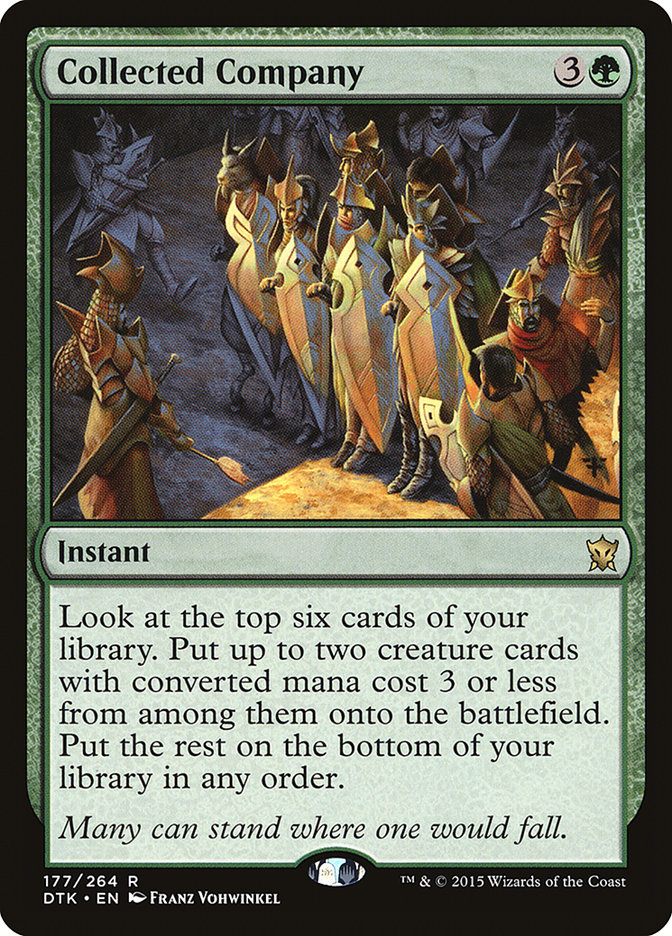
Heliod Company has consistency and a strong backup plan — two essential traits for successful combo decks. While most decks generally get one or the other, Heliod Company has both. Collected Company, Eladamri’s Call, and Ranger-Captain of Eos will all help you assemble one of the combos above.
The nice thing about Collected Company and Ranger-Captain of Eos is that they both contribute to a reasonable Plan B: simply attack the opponent with reasonable creatures. Often, the decks that are going to stop you from comboing are the ones that load up on interaction; Ranger-Captain and Collected Company are each two-for-ones when you need to clear through one-for-one removal spells. Additionally, Gavony Township and Heliod’s ability to give lifelink to creatures will turn even the smallest Arbor Elf into a red zone threat in elongated games.
Metagame Breakdown
The MOCS was a 24-player tournament, so we have a relatively small metagame to analyze. Here’s the full list of decks:
- 2 Temur Scapeshift
- 2 Temur Control
- 1 Eldrazi Tron
- 1 Jund Shadow
- 1 Humans
- 1 Mono-Red Prowess
- 2 Rakdos Shadow
- 2 Oops All Spells
- 2 Heliod Company
- 4 Omnath Control
- 1 Jund
- 1 Amulet Titan
- 1 Burn
- 1 Tron
- 1 Ad Nauseam
- 1 Bant Spirits
This is actually a reasonably diverse metagame, but one without many predators as far as Heliod Company is concerned. In this field, I would be wary of Oops All Spells and Amulet Titan, as they are both faster combo decks and Heliod Company is short on ways to meaningfully interact with either of them.
After that, Jund, Death’s Shadow decks, and Prowess are likely close match-ups because they can all provide the correct mix of pressure and disruption, but the avenues to interact open up. Heliod is a powerful tool against both Death’s Shadow and Prowess; the lifelink ability will come in clutch, threatening to shut off Death’s Shadow if it ever gets into combat. While Jund isn’t in danger of losing longer games, the deck is just slow enough that it might give the Heliod player enough time to set up a winning position.
All the Uro-based control decks seem like pretty even match-ups. They pack a ton of interaction, but nearly all of it is in the form of counterspells. If the Heliod player can get on the battlefield, the control player will often struggle to defend themself against a board of multiple creatures. There were many games over the course of the tournament where Michael Jacob just got a few creatures onto the board against an Uro-based control deck, and they simply couldn’t muster enough of a defense against the “attack with random creatures” plan.
Scapeshift, Eldrazi Tron, Humans, Burn, Tron, Ad Nauseam, and Spirits all seem like positive match-ups for Heliod Company. Scapeshift and Ad Nauseam are slower combo decks that can’t interact with the Heliod player in meaningful ways. Humans and Burn will often lose to decks that can plug up the ground, or decks that gain some life — both of which Heliod does effectively. Tron and Eldrazi Tron both seem like they’re dead in the water against Heliod Company, as they both don’t kill very quickly, and can’t do much to stop the combo.
All in all, this seems like a field that is quite vulnerable to a deck like Heliod Company because they either can’t stop the combos, or are susceptible to getting the beatdown from the swath of utility creatures. Michael Jacob picked well here and was rewarded for it.
Pairings and Results
We know the metagame, and thankfully, because this is a premier event, we have access to the pairings and results from the entire tournament.
Round 4: Toni Ramis Pascual (Amulet Titan) wins 2-1 against Michael Jacob
Round 5: Michael Jacob wins 2-1 against Christoffer Larson (Oops All Spells)
Round 6: Michael Jacob wins 2-1 against Oliver Tiu (Omnath Control)
Round 7: Michael Jacob wins 2-1 against Logan Nettles (Jund)
Michael started the Modern portion of the tournament off with a loss, which is always tough, especially against Amulet Titan. Rounds five through seven, Michael picked up wins against Oops All Spells, Omnath Control and Jund. Oops All Spells is certainly a bad match-up for Michael, but he came prepared with Surgical Extraction and Eidolon of Rhetoric. The Omnath match-up was muddy to say the least, but Michael managed to pick up another win there. To round things out, Michael beat Jund, leaning on the power of Collected Company, Ranger-Captain of Eos, and Auriok Champion.
Michael went 3-1 during the Modern portion of the Swiss rounds, and the Top 4 held more Modern Magic for us to enjoy as well. These were Modern/Pioneer split rounds, and the higher-seeded player chose the format for Game 3.
Semi-Finals
Michael Jacob wins against Matti Kuisma
This was a three-game match against Temur Control, where neither player got to do a whole lot. Both players flooded out — Matti with lands, and Michael with Heliods, at one point having one in play and the remaining three in hand. This was the match where the beatdown plan came in big. Game 3 was decided by Michael getting a couple creatures on the board, and Matti was just unable to remove them before succumbing to the pressure.
Finals
Michael Jacob wins against Logan Nettles
The rematch against Logan only contained one Modern match, as Logan elected for the third match to be Pioneer. Michael was able to come out on top in the Heliod Company vs. Jund match-up, again largely on the back of the beatdown plan. Heliod, Auriok Champion and Scavenging Ooze got the job done against the midrange monster that is Jund.
Overall Modern record: 5-1
Conclusion
It looks like Heliod Company was an excellent choice for the MOCS, as Michael Jacob was able to pilot it to a 5-1 finish in the Modern portion of the event. Sometimes, in split format events, a single deck can do a lot of heavy lifting, and Heliod Company certainly showed up to carry a great deal of weight.
The good news for Heliod Company going forward is that the MOCS metagame was fairly diverse and pretty close to the Modern metagame at large. If you’ve been following my Modern Metagame Updates, you may have noticed that Heliod Company has been trending up in the open tournaments; I wouldn’t be surprised if we see that trend continue.
Congratulations again to Michael Jacob for taking down the MOCS with an excellent Modern deck that is really hitting its stride.

Michael Rapp is a Modern specialist who favors Thoughtseize decks. Magic sates his desire for competition and constant improvement.

